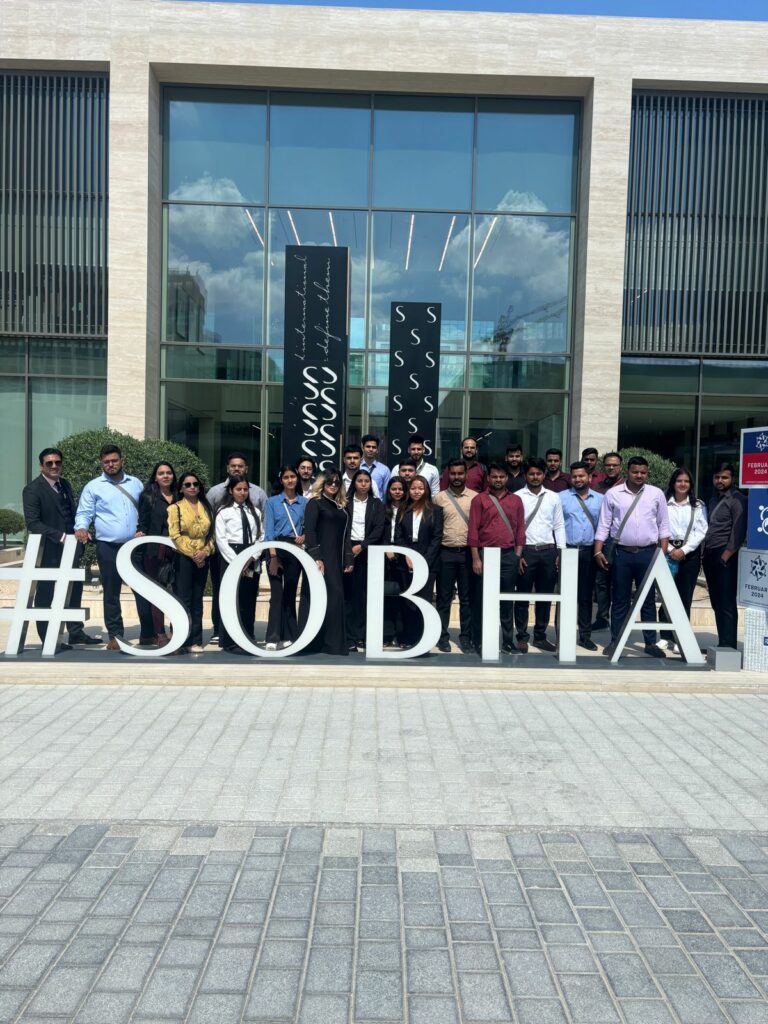MBA Subjects – Semester Wise

Image – 1 SAITM Campus Boys Hostel
The semester-wise MBA subjects syllabus is organized to cultivate core business expertise and specialized abilities through a blend of theoretical instruction and practical experiences. This encompasses lectures, case studies, projects, and internships, all aimed at enriching learning.
Semester 1
Principles of Management: Introduction to management theories, practices, and case studies.
Organisational Behaviour: Study of human behaviour in organizational settings.
Marketing Management: Fundamentals of marketing strategies and practices.
Quantitative Methods: Basic statistical techniques and their applications in business.
Financial Accounting: Introduction to accounting principles and practices.
Semester 2
Financial Management: Techniques and theories in managing corporate finances.
Human Resource Management: Theories and practices in recruitment, training, and development.
Business Research Methods: Methodologies for conducting business research.
Operations Management: Study of production and operations techniques.
Managerial Economics: Application of economic theory to business management.
Semester 3
Strategic Management: Long-term planning and strategy formulation.
Supply Chain Management: Overview of supply chain design and management.
Electives: Students choose from a range of optional subjects based on their interests and career goals (e.g., Digital Marketing, International Business).
Semester 4
Business Ethics and Corporate Governance: Study of ethical practices and governance in business.
Project Work: Capstone project involving real-world business problems.
Electives/Specialization Courses: Continued specialization in areas such as Finance, Marketing, or Operations.
Some of the most opted courses in India and St. Andrews college or different Engineering college or Management colleges are as follows:-
- Btech
- Btech CSE
- Btech ETCE
- MTech
- BCA
- BBA
- MBA
- MCA
- DPharma – St. Andrews College of Pharmacy
- BPharma – St. Andrews College of Pharmacy
- BArch – St. Andrews College of Architecture
MBA Syllabus – Important Facts

Image – 2 Degree Distribution at SAITM Campus
The MBA subjects offer a broad and thorough business education, preparing students with the essential skills and knowledge needed for diverse management positions. Here are key details about the MBA syllabus that highlight its comprehensive scope and diversity:
Holistic Business Education
Interdisciplinary Approach: The MBA syllabus integrates various disciplines such as economics, psychology, sociology, and information technology to provide a holistic understanding of business management.
Foundation Courses: Early courses typically cover fundamental business principles in areas such as accounting, finance, marketing, and management to build a solid foundation.
Specialization and Electives
Customization Through Electives: Students can tailor their education to their career goals through electives. Popular specializations include Finance, Marketing, Human Resources, and Operations Management.
Emerging Fields: Many programs now offer courses in emerging areas such as digital marketing, data analytics, and sustainable business practices.
Practical and Theoretical Balance

Image – 3 Management IT Labs
Case Studies and Real-World Applications: Syllabus often includes case studies to help students apply theoretical knowledge in real-world scenarios, enhancing decision-making skills.
Capstone Projects and Internships: These are integral parts of the curriculum, offering hands-on experience in industry settings, which is crucial for applying classroom lessons in practical settings.
Development of Soft Skills
Leadership and Teamwork: Courses and projects that focus on leadership, ethics, and teamwork skills are crucial for preparing students to manage teams and lead organizations.
Communication Skills: Emphasis on developing strong verbal and written communication skills, essential for effective management and leadership.
Global and Cultural Perspectives

Image – 4 International (DUBAI) Trip for Management Students
International Business: Many MBA (Master of Business Administration) programs include courses on global or international business, reflecting the globalized nature of today’s economy.
Cultural Sensitivity: Courses that foster cultural awareness and competency, important for working in diverse environments.
Continuous Learning and Adaptation
Changing Curriculum: MBA programs often update their syllabi to reflect the latest trends and challenges in business, technology, and economy.
Alumni Learning Opportunities: Some programs offer lifelong learning opportunities for alumni, allowing them to update their skills as business paradigms evolve.
Assessment and Evaluation
Diverse Methods of Assessment: Evaluation methods in an MBA program may include exams, project reports, presentations, and group work, all aimed at assessing a range of skills from analytical to interpersonal.
These components of the MBA syllabus ensure that graduates are not only proficient in technical business areas but also excel in leadership and strategic decision-making, prepared for the complexities of modern business environments.
MBA Syllabus and Subjects

Image – 5 Best College Award
The MBA (Master of Business Administration) syllabus is meticulously crafted to establish a solid foundation in core business disciplines, while also imparting specialized knowledge and practical skills essential for leadership and management roles. Here is an in-depth look at the typical range of MBA subjects and the structure of the syllabus throughout the program:
MBA Core Subjects
Semester 1
- Financial Accounting
- Introduction to accounting concepts
- Preparation and analysis of financial statements
- Managerial Economics
- Economic theories and tools for business decision-making
- Market analysis and consumer behavior
- Statistics for Management
- Statistical methods for data analysis
- Application in business decisions
- Marketing Management
- Marketing principles and strategies
- Consumer behavior and market research
- Organizational Behaviour
- Human behaviour in organizations
- Leadership and team dynamics
Semester 2
- Financial Management
- Financial analysis and planning
- Investment and funding decisions
- Operations Management
- Production processes and efficiency
- Supply chain and logistics management
- HRM
- Recruitment, training, and development strategies
- Employee performance and labor relations
- Business Research Methods
- Research design and methodologies
- Quantitative and qualitative analysis
- Management Information Systems
- Information technology in business
- Systems design and data management
Electives and Specializations
Semester 3 & 4
- Strategic Management
- Long-term planning and competitive strategy
- Business policy and corporate governance
- Business Ethics and Corporate Social Responsibility
- Ethical decision-making in business
- Social and environmental impact of business practices
- Elective Courses
- Students can choose from a variety of optional subjects depending on their area of interest, such as:
- International Business
- Entrepreneurship
- Digital Marketing
- Business Analytics
- Finance and Banking
- Healthcare Management
- Students can choose from a variety of optional subjects depending on their area of interest, such as:
- Capstone Project
- A major project involving real-world business problems, requiring strategic analysis and solutions.
Additional Learning Components
- Workshops and Seminars: Opportunities to engage with industry leaders and experts.
- Internships: Practical work experience in a business setting, enhancing real-world skills.
- Global Exposure: Some programs offer international trips or exchanges to understand global business environments.
Evaluation Methods
- Assessments typically include a combination of exams, assignments, projects, and presentations to evaluate both theoretical understanding and practical application skills.
This comprehensive curriculum ensures that MBA graduates are well-prepared to enter any field of business with the necessary skills to succeed and lead. Each MBA program may slightly differ in how they structure these subjects and the specific content covered, so it’s important to review the specific curriculum details of the program you are interested in.
MBA Syllabus: Semester-Wise Breakdown

Image – 6 Inside View of SAITM Campus
Below is a detailed semester-wise breakdown of an MBA syllabus, highlighting key subjects typically taught in most MBA courses. This curriculum structure ensures a well-rounded education in business management, covering core business principles, advanced concepts, and integration through practical applications.
Semester-Wise MBA Syllabus
Semester 1: Core Foundations
- Financial Accounting
- Basics of accounting, financial statement analysis, and reporting.
- Managerial Economics
- Economic theory applied to business decisions; market structure and pricing.
- Quantitative Methods
- Statistical analysis and its application in business decisions.
- Marketing Management
- Fundamental marketing concepts, strategies, and consumer behavior analysis.
- Organizational Behaviour
- Study of individual and group behaviour in organizational settings.
Semester 2: Core Business Functions
- Financial Management
- Concepts of financial planning, analysis, and control; investment management.
- Human Resource Management
- Strategies for managing people and work in organizations; recruitment, training, and development.
- Operations Management
- Production and operations strategy, process design, and supply chain management.
- Business Research Methods
- Introduction to research methodology; techniques for data collection and analysis.
- Management Information Systems
- Role of IT in organizations; systems design and implementation.
Semester 3: Advanced Management and Specialization
- Strategic Management
- Corporate strategy formulation and implementation; competitive strategy.
- Business Ethics and Corporate Governance
- Ethical decision-making, corporate governance frameworks, and responsibilities.
- Elective 1 (Example: Digital Marketing)
- In-depth study of digital marketing tools, SEO, content marketing, and social media strategies.
- Elective 2 (Example: Business Analytics)
- Techniques in data analytics, predictive modeling, and decision support systems.
- Project Work
- Application of learned skills to a real-world business problem or research project.
Semester 4: Integration and Specialization
- Supply Chain Management
- Advanced concepts in supply chain design, logistics, and global operations.
- Leadership and Change Management
- Leadership theories, change management strategies, and organizational development.
- Elective 3 (Example: International Business)
- Study of global trade theories, international market analysis, and export-import strategies.
- Elective 4 (Example: Entrepreneurship)
- Entrepreneurial management, venture creation, and startup ecosystems.
- Capstone Project
- A comprehensive project that integrates various aspects of the MBA learning experience, often involving strategy and analysis.
Additional Learning Components:
- Seminars and Guest Lectures: Regular interactions with business leaders and experts.
- Internships: Practical exposure to business operations, often between semesters or as part of the curriculum.
- Global Exposure: Optional study tours or exchange programs with partner institutions abroad.
MBA Specialisations

Image – 7 Discussion about the Projects
MBA programs are structured with a diverse MBA syllabus that includes various specializations to suit different business interests and career objectives. Here are some common specializations typically offered in MBA programs:
Finance
This specialization focuses on financial planning, management, and analysis. It includes topics like corporate finance, investment banking, and financial markets.
Marketing
Students learn about market research, consumer behavior, branding, and digital marketing strategies. This specialization is ideal for those looking to enter advertising, PR, or market research industries.
Operations Management
This area focuses on the efficient management of production and operations. It covers supply chain management, logistics, and quality control.
Human Resources Management
HRM specializes in managing people in organizations. Topics include recruitment, training, performance management, and employee relations.
Information Technology (IT) Management
This specialization deals with the management of technology resources, IT infrastructure, and information systems within businesses.
Entrepreneurship
Ideal for those looking to start their own businesses, this specialization teaches business plan development, innovation, and venture financing.
Strategy
This covers the formulation and implementation of business strategies to improve competitive advantage. It often includes courses on business development, strategic management, and competitive analysis.
International Business
For students interested in global commerce, this specialization covers international market dynamics, cross-cultural management, and global economic environments.
Healthcare Management
This prepares students for roles in the healthcare sector by covering healthcare systems, policies, economics, and management practices.
Sustainability
Increasingly popular, this specialization focuses on sustainable business practices, environmental management, and corporate social responsibility.
Each specialization equips students with targeted skills and knowledge, preparing them for specific sectors or managerial roles in various industries.
According to Maharishi Dayanand University MBA Syllabus Based on Specializations

Image – 8 New Management Block
An MBA (Master of Business Administration) program typically provides a range of specializations tailored to diverse career aspirations and interests. Each specialization features distinct MBA subjects within its syllabus, aimed at furnishing students with specialized skills and knowledge.
MBA Specializations and Key Courses
Semester I
Management Concepts and Organizational Behaviour, Managerial Economics, Accounting for Managers, Business Statistics and Analytics, Operations Management, Computer Fundamentals and Office Automation Tools, Business Environment
Elective Subjects
Business Communication Skills, Event Management
Semester II
Financial Management, Business Research Methods, Marketing Management, IT Infrastructure Management, HRM, Comprehensive Viva-voce
Elective Subjects
Entrepreneurship, Creativity and Innovation Management
Semester III
CORE COURSES
Strategic Management, Operations Research, Corporate Laws, Summer Training Report
Discipline Specific Elective Courses (specialization areas offered under dual specialization scheme)
HUMAN RESOURCE MANAGEMENT
Compensation and Benefits Management, Management of Industrial Relations, Organizational Change and Intervention Strategies, Strategic Human Resource Management, Human Resource Metrics and Analytics
FINANCE MANAGEMENT
Indian Financial System and Financial Markets, Investment Management, Project Management, Bank Management, Business Taxation
INFORMATION TECHNOLOGY MANAGEMENT
E-Commerce and Applications, Multimedia and Web Development, Data Ware Housing and Data
Mining, Enterprise Resource, Planning E-Governance and Framework of ICT
MARKETING MANAGEMENT
Digital Marketing, Consumer Behaviour, Customer Relationship Management, Retail Management, Services Marketing
BUSINESS ANALYTICS
Business Analytics, Predictive Business, Analytics Fundamentals of Data Mining, Time Series Econometrics, Fundamental of Econometrics
PUBLIC POLICY MANAGEMENT
Legal Institutional Dynamics, Development Economics, Right To Information Act, Public Finance, Administration Risk and Disaster Management
AGRI-BUSINESS MANAGEMENT
Agri-business Environment and Policy, Food Technology and Process Management, Agri-business Management, Agri-business Entrepreneurship
Semester IV
CORE COURSES
B2B Marketing, Project Report, CSR and Business Ethics, Comprehensive Viva-voce 1
Discipline Specific Optional Subjects (specialization areas offered under dual specialization scheme)
HUMAN RESOURCE MANAGEMENT
Business Negotiations and Employee Relations, International Human Resource Management, Training and Development, Performance Management Systems, Managing Interpersonal and Group Processes
FINANCE MANAGEMENT
Insurance and Risk Management, International Financial Management basics, Management of Financial Services, Financial Decision Analysis, Financial and Commodity Derivatives
INFORMATION TECHNOLOGY MANAGEMENT
Knowledge Management, Programming in Visual Basic, Information Security and Cyber Laws, E-Business Information Systems Management, Systems Analysis and Design
MARKETING MANAGEMENT
Integrated Marketing Communications, Sales and Distribution Management, Marketing Research, Industrial Marketing, Product and Brand Management
BUSINESS ANALYTICS
Economics for Business Strategy, Mathematical Statistics, Applied Multivariate Analysis, Market Microstructure, Information Economics and its Applications
PUBLIC POLICY MANAGEMENT
Public Policy Evaluation, Social Campaign Promotion, Sustainable Development, Rural Development, Indian Social and Political System
AGRI-BUSINESS MANAGEMENT
Agricultural Input Marketing and Post-Harvest Management, Livestock Business Management, Agribusiness Financial Management, Agricultural Marketing Management
MBA Books and Authors

Image – 9 Management Faculty with Students
For students pursuing an MBA, several foundational and advanced textbooks are essential for various specializations. List some of the widely recommended books for general MBA courses as well as for specific specializations. These books are authored by experts in their respective fields and are frequently used in MBA programs globally.
General MBA Books and Authors
“Management” by Stephen P. Robbins and Mary Coulter
- A comprehensive guide covering all aspects of business management, including organizational behavior and decision-making.
“Marketing Management” by Philip Kotler and Kevin Lane Keller
- This book is often considered the bible for marketing students and professionals, providing in-depth knowledge about marketing strategy and consumer behavior.
“Competitive Strategy: Techniques for Analyzing Industries and Competitors” by Michael E. Porter
- A seminal text on understanding industry structure and competitive strategy.
“Financial Management: Theory & Practice” by Eugene F. Brigham and Michael C. Ehrhardt
- A crucial resource for understanding corporate finance, including analysis, planning, and decision-making.
“Operations Management” by William J. Stevenson
- Explores the fundamentals of operations management with an emphasis on production and manufacturing processes.
Specialized MBA Books and Authors

Image – 10 SAITM Dining Hall
Finance:
- “Investments” by Zvi Bodie, Alex Kane, and Alan J. Marcus
- This book provides a solid foundation in investment principles and methodology.
Marketing:
- “Consumer Behavior: Buying, Having, and Being” by Michael R. Solomon
- Delves into the psychology of how consumers decide what to buy, with real-world applications for marketing strategy.
Human Resources:
- “Human Resource Management” by Gary Dessler
- Focuses on the latest HR practices and theories, integrating international HRM strategies.
Information Technology:
- “Management Information Systems: Managing the Digital Firm” by Kenneth C. Laudon and Jane P. Laudon
- Covers comprehensive aspects of information systems, their management, and how they provide essential advantages to businesses.
International Business:
- “International Business: Competing in the Global Marketplace” by Charles W. L. Hill
- Provides insights into the challenges and opportunities in global business.
Entrepreneurship:
- “The Lean Startup: How Today’s Entrepreneurs Use Continuous Innovation to Create Radically Successful Businesses” by Eric Ries
- Focuses on innovative startup strategies that lead to successful business models.
Healthcare Management:
- “Healthcare Management: Strategy, Structure, and Process” by Peter M. Ginter, W. Jack Duncan, and Linda E. Swayne
- Discusses strategic management and operational directives specific to healthcare organizations.
Sustainability:
- “Sustainable Business and Industry: Designing and Operating for Social and Environmental Responsibility” by Joseph Jacobsen
- Provides approaches for integrating sustainability into business operations.
MBA Entrance Exam Syllabus

Image – 11 Convocation Ceremony
MBA entrance exams are critical for students aspiring to join prestigious business schools. The syllabus for these exams generally covers a broad range of topics to assess the aptitude and skills of candidates. Below is a general outline of the key topics commonly found in MBA entrance exams:
1. Quantitative Aptitude
Arithmetic: Number Systems, Ratio & Proportion, Time & Work, Mixtures & Allegations, Percentages, etc.
Algebra: Linear Equations, Quadratic Equations, Progressions, Inequalities, etc.
Geometry: Lines, Angles, Triangles, Circles, Polygons, Mensuration, etc.
Modern Mathematics: Permutation & Combination, Probability, Sets & Functions, etc.
Data Interpretation: Graphs, Charts, Tables, Data Sufficiency, etc.
2. Verbal Ability & Reading Comprehension
Reading Comprehension: Passages followed by questions on central theme, inferences, and vocabulary.
Verbal Ability: Sentence Correction, Sentence Completion, Sentence Rearrangement, Grammar, etc.
Vocabulary: Synonyms, Antonyms, Analogies, Idioms, and Phrases.
3. Logical Reasoning and Data Interpretation
Logical Reasoning: Sequences and Series, Arrangements, Family Tree, Coding-Decoding, Assumptions, and Conclusions, etc.
Data Interpretation: Analysis and interpretation of data based on text, tables, graphs (line, area), charts (column, bar, pie), venn diagram, etc.
4. Analytical Writing Assessment (AWA)
Essay Writing: Analysis of an Argument, where candidates need to analyze the given argument and critique its reasoning.
5. Integrated Reasoning
- Graph Interpretation
- Table Analysis
- Multi-source Reasoning
- Two-part Analysis
Examples of MBA Entrance Exams and Their Specific Focus
CAT (Common Admission Test): Heavily focused on quantitative aptitude, logical reasoning, and verbal ability. Used primarily for admission to Indian business schools like the IIMs.
XAT (Xavier Aptitude Test): Includes Decision Making as a unique section along with quantitative ability, verbal ability, and logical reasoning.
Distance MBA Syllabus

Image -12 National Conference Hosted by SAITM
The syllabus for a Distance MBA (Master of Business Administration) program generally covers the same core areas as a traditional MBA but is tailored for remote study, often with more flexible pacing and sometimes a focus on practical applications suitable for working professionals.
The curriculum is designed to ensure that students receive a comprehensive education in business management, even when they are not physically present on campus.
Here’s an example of a typical Distance MBA syllabus, divided into core courses and optional subjects that students might encounter:
Core Courses
Management Theory and Practice
- Basics of management, organizational theories, leadership styles, and strategic planning.
Business Communication
- Effective business writing, communication strategies, presentation skills, and corporate communication.
Accounting for Managers
- Financial and managerial accounting principles, balance sheets, profit and loss statements, cash flow analysis.
Economics for Managers
- Microeconomics and macroeconomics principles, demand and supply analysis, market structures, fiscal and monetary policies.
Business Statistics
- Statistical methods for decision-making, data analysis, probability, forecasting and regression models.
Marketing Management
- Marketing concepts, market research, consumer behavior, marketing strategy, digital marketing.
Financial Management
- Financial analysis, capital management, investment decisions, budgeting, financial markets and institutions.
Human Resource Management
- HR planning, recruitment, selection, training and development, performance management, employee relations.
Operations Management
- Production planning, project management, quality control, supply chain management, logistics.
Strategic Management
- Competitive analysis, strategic thinking, corporate strategy, business policy.
Elective Courses
Elective subjects in a Distance MBA course allow students to specialize in a particular area of business. Here are some common specializations and elective modules:
Finance
- Investment Analysis, Portfolio Management, International Finance, Corporate Taxation.
Marketing
- Brand Management, Digital Marketing Strategies, Sales Force Management, Consumer Relationship Management.
Information Technology
- Information Systems Management, E-Business, Data Analytics, IT Project Management.
International Business
- Global Business Environment, International Trade Operations, Cross-Cultural Management, Export-Import Management.
Entrepreneurship
- New Venture Creation, Business Plan Development, Entrepreneurial Finance, Innovation Management.
Healthcare Management
- Healthcare Administration, Patient Care Management, Healthcare Laws and Ethics, Hospital Management.
Capstone Project
Most Distance MBA courses also include a capstone project, which is a practical project where students apply what they have learned to real-world business problems. This might involve a consultancy project, a research project, or the development of a new business plan.
Additional Components
Workshops and Webinars: Although it’s a distance program, many institutions offer periodic live sessions, workshops, or webinars to provide interaction with faculty and peers.
Virtual Simulations: Some programs may include simulations and games to teach complex concepts in an engaging way.
Popular MBA Colleges

Image – 13 Skills Development workshop
India hosts a diverse range of prestigious MBA colleges renowned for their rigorous academics and promising career opportunities. This list includes both premier institutes and other significant players in the field of management education in India:
Premier Institutes
Indian Institute of Management (IIM) Ahmedabad
- Often ranked as the top MBA college in India, known for its case-study pedagogy and excellent placement records.
Indian Institute of Management (IIM) Bangalore
- Renowned for its strong focus on information technology and business analytics.
Indian Institute of Management (IIM) Calcutta
- Famous for its finance-related courses and strong alumni network.
Indian School of Business (ISB), Hyderabad
- Known for its one-year PGP program and strong ties with international business schools.
Faculty of Management Studies (FMS), Delhi
- Offers high ROI with low tuition fees and high placement packages, known for its rigorous curriculum.
Other Notable Institutes
St. Andrews Institute of Technology and Management (SAITM), Gurgaon

Image – 14 SAITM Admin Block
- Though lesser-known in comparison to the giants, SAITM offers competitive MBA courses focused on industry-relevant skills and practical knowledge. Their curriculum is designed to meet the dynamic demands of the business world, providing students with both theoretical and practical insights necessary for effective management and leadership roles.
S.P. Jain Institute of Management and Research (SPJIMR), Mumbai
- Offers specialized courses with a focus on entrepreneurship and global exposure.
National Institute of Industrial Engineering (NITIE), Mumbai
- Specializes in Supply Chain and Operations Management, primarily for engineers.
Jamnalal Bajaj Institute of Management Studies (JBIMS), Mumbai
- Known for its Masters in Management Studies (MMS) program, offering excellent exposure to the financial sector.
FAQs
Which type of MBA is best?
The best type of MBA depends on your career goals, lifestyle, and learning preferences. For career advancement in a specific industry, a specialized MBA (like in Finance or Technology) might be ideal. If you seek flexibility due to work or personal commitments, an Online MBA or Part-time MBA could be best. For those looking to immerse themselves fully in their studies, a Full-time MBA might be preferable. Evaluate your needs and research programs to find the one that aligns best with your objectives.
How many subjects are in MBA?
The quantity of subjects in an MBA course can fluctuate depending on the institution and the particular structure of the program. Generally, an MBA curriculum comprises core subjects and electives, as delineated in the MBA subjects list.
Core Subjects: These are mandatory for all students and cover fundamental areas of business such as Finance, Marketing, Human Resources, Operations Management, Economics, and Organizational Behaviour. Most programs include about 10-15 core courses.
Electives: These allow students to specialize in areas of interest or focus more deeply on specific business sectors such as Healthcare Management, International Business, or Entrepreneurship. The number of optional modules can vary widely, but students might take anywhere from 5 to 15 elective subjects.
Which MBA course is best?
The best MBA course depends on your career goals and interests. For broad managerial skills, consider a General Management MBA. For finance careers, an MBA in Finance is ideal. Marketing, International Business, or Entrepreneurship MBAs are perfect for specialized roles. Research and align your choice with your career aspirations.
What are the subjects for MBA first year?
In the first year of an MBA degree, students typically cover core subjects that provide a foundational understanding of business management. These core courses generally include:
- Financial Accounting
- Managerial Economics
- Marketing Management
- Human Resource Management
- Business Statistics or Quantitative Methods
- Operations Management
- Corporate Finance
- Organizational Behavior
- Business Ethics and Law
- Strategic Management
These subjects aim to equip students with essential business skills and an understanding of various managerial functions.
Is MBA syllabus hard or easy?
The difficulty of an MBA syllabus varies based on individual backgrounds and abilities. Those with a business or quantitative foundation may find it easier, while others might struggle with complex concepts and a rigorous pace. Overall, it demands strong analytical skills, effective communication, and practical application of theories.
What are the subjects in MBA?
MBA courses typically include core subjects like Financial Accounting, Marketing Management, Operations Management, and Organisational Behaviour. Electives allow specialization in areas like Finance, Entrepreneurship, or International Business. The curriculum is designed to build comprehensive management skills and practical business acumen.
Is MBA difficult?
The difficulty of an MBA course varies based on one’s background and experience. It involves rigorous coursework, complex problem-solving, and practical applications in business contexts. Balancing studies with personal and professional commitments can also be challenging. However, it is highly rewarding and beneficial for career advancement.
Is maths compulsory for MBA?
Mathematics is not typically a mandatory prerequisite for MBA admissions, but proficiency in basic math is essential for the coursework. MBA degrees often include quantitative subjects like Finance, Economics, and Statistics, requiring a good grasp of mathematical concepts. Thus, while not compulsory for entry, strengthening math skills can significantly enhance your ability to succeed in an MBA degree.
What is full time MBA?
A full-time MBA is a graduate-level business program pursued on a full-time basis, usually spanning two academic years. It offers comprehensive education in business fundamentals, leadership skills, and practical experiences, often including internships. Students typically attend classes during weekdays and may engage in extracurricular activities or networking events.
Human Resource Management
HRM is the strategic approach to managing people within an organization to optimize their productivity and contribution to achieving organizational goals. It involves activities such as recruitment, selection, training, performance appraisal, and employee relations, all aimed at maximizing employee effectiveness and satisfaction while aligning with organizational objectives.
What is Master of Business Administration?
A Master of Business Administration (MBA), a regular MBA, is a graduate-level degree program that centers on various aspects of business management and administration. It furnishes students with a holistic comprehension of business principles, leadership competencies, and analytical proficiencies crucial for success across diverse industries and organizational settings.





